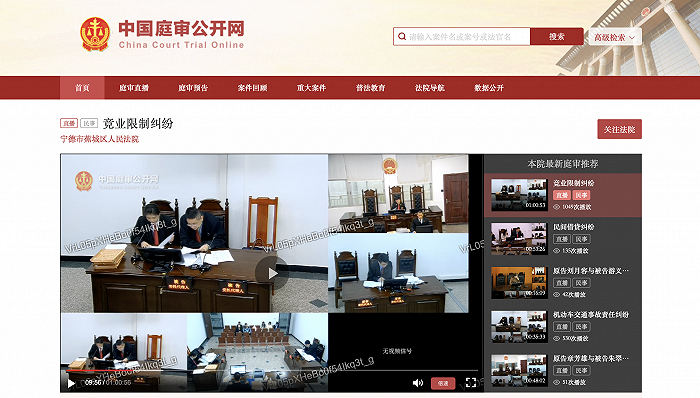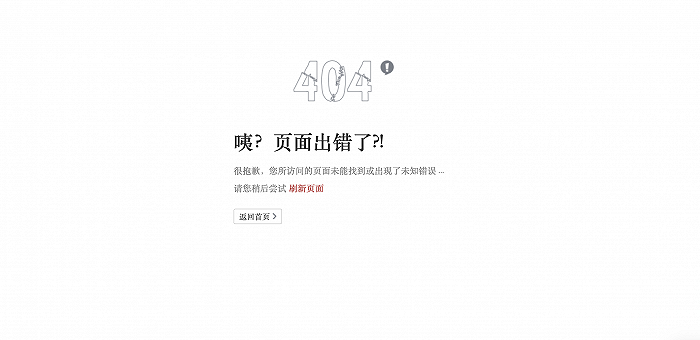In violation of the non-compete agreement, the chairman of Haichen Energy Storage paid 1 million yuan to CATL
A live broadcast of the trial on China's trial open network involved the "big melon" of the lithium battery energy storage industry.
At 9:06 on November 28, the China Trial Open Network broadcast a civil non-compete dispute trial in the People's Court of Jiaocheng District, Ningde City on the same day, with Zhang Min as the plaintiff and CATL (300750.SZ) as the defendant. The focus of the dispute between the two parties was whether Zhang Min violated the relevant non-compete provisions and was required to pay liquidated damages to CATL, and the specific amount.
In the defense of CATL's lawyers, another "big melon" behind it was even involved, that is, Wu Zuyu, the founder of Haichen Energy Storage, had been ruled by the arbitration commission to violate the non-compete agreement and compensated CATL with 1 million yuan in liquidated damages.
During the trial stage, CATL's lawyer issued evidence in the Ninglao Renzhong Case (2023) No. 191 ruling, which confirmed the authenticity of this information. Wu Zuyu was formerly an employee of CATL and is now the legal representative and chairman of Haichen Energy Storage. From July 2012 to November 2018, Wu Zuyu was the first inventor of CATL to sign 67 patents involving current collectors, pole pieces and batteries in the field of energy storage.
According to the transfer records issued by the above-mentioned lawyer at the same time, Wu Zuyu recognized the content of the arbitration commission's award, and on September 23, 2023, through his wife Lin Xiuhua (the former legal representative of Haichen Energy Storage), paid 1 million yuan in liquidated damages to CATL, with the postscript "Liquidated damages in the award of Ninglao Renzhong Case (2023) No. 191".

Wu Zuyu not only violated the agreement himself, but also used his work experience and connections in CATL to poach a large number of core technical talents of CATL, and quickly seized the energy storage market in two years, which caused immeasurable losses to CATL, which is not enough to make up for 1 million. CATL's lawyers said that in just two years, the actual shipments of Haichen Energy Storage have achieved a rapid growth of more than 40 times, becoming a strong competitor of CATL.
As of press time, neither CATL nor Haichen Energy Storage has responded to Jiemian News on this matter.


In response to the above-mentioned trial case, CATL's lawyer said that under the circumstance of knowing the non-compete agreement, Haichen Energy Storage deliberately circumvented the non-compete agreement by cooperating with the Research Institute of Rare Earth Materials, and arranged Zhang Min to work in the research institute, which actually served Haichen Energy Storage, and Zhang Min should be held liable for breach of contract for violating the non-compete agreement.
In March 2023, CATL photographed Zhang Min wearing a badge of Haichen Energy Storage and entering and leaving the Haichen Energy Storage Plant, from which he learned that his rights had been infringed. CATL said that Zhang Min held many of its trade secrets during his tenure at CATL and was the target of the company's restricted stock incentives from 2018 to 2021, and the list of incentive recipients clearly stated that Zhang Min was the core backbone member of the company.
CATL has paid Zhang Min 89,263.41 yuan in non-compete compensation according to the agreement, and the company's lawyer believes that the amount of breach of contract is not too high, and Zhang Min directly or indirectly provides services for Haichen Energy Storage, and the losses and threats caused to CATL are huge and immeasurable.
Therefore, CATL did not agree to Zhang Minfang's request. In the end, after nearly an hour of argument between the two sides, the original defendant and the defendant were unable to mediate, so they announced the verdict on another day and adjourned the trial.
On November 29, Jiemian News reporters noticed the above-mentioned live broadcast information of the trial, and it was no longer possible to find the video on the China Trial Open Network at about 17 o'clock in the afternoon.

In recent years, CATL has been involved in many lawsuits with its peers due to non-compete issues. In February last year, CATL sued SVOLT for unfair competition because nine employees joined Wuxi Tianhong and Baoding Yixin respectively after leaving to provide services for SVOLT.
Founded in 2019, Haichen Energy Storage is an "upstart" in the energy storage industry in recent years, with an astonishing development speed, and has carried out six rounds of financing, with a company valuation of nearly 30 billion yuan, and is currently impacting the IPO.
According to data from Zhongguancun Energy Storage Industry Technology Alliance, in the list of energy storage battery shipments in 2022, CATL ranks first, and Haichen Energy Storage ranks sixth. This year, Hichain Energy Storage shipped 5 GWh of energy storage batteries, and CATL shipped 53 GWh of energy storage batteries, which was 10 times that of Hichen. CATL's global energy storage battery shipment market share is as high as 43.4%.
Although it has not been established for a long time, Haichen Energy Storage has "earned enough eyeballs" in the industry, and the company attaches great importance to marketing and frequently delivers advertisements.
In terms of promotional slogans, Haichen Energy Storage said that in 2022, Haichen Energy Storage's batteries will win the "double first" in the industry: the first in the number of power energy storage battery delivery projects in China and the first in the growth rate of energy storage battery shipments in China in 2022. At the same time, Haichen Energy Storage emphasized that the battery has a three-year "zero" attenuation rate. These promotions have been frequently evaluated by industry insiders as "too high-profile", which makes some controversies in the marketing of Haichen Energy Storage.
In September this year, Haichen Energy Storage also revealed that it was returned 2 billion yuan due to product quality problems, although Haichen Energy Storage issued a statement denying it and said that it had reported the case, but it is undeniable that this still has a certain reputational impact on Haichen Energy Storage.
Wang Pengcheng, co-founder and general manager of Haichen Energy Storage, once said that in 2023, the growth rate of battery shipments of Haichen Energy Storage will exceed 500%, and it is expected that the annual energy storage battery shipments will exceed 25 GWh, and the goal is to strive to achieve the first place in the delivery of electric energy storage batteries in China.
Hichain Energy Storage is expected to achieve an annual production capacity of more than 100 GWh in 2024 and 135 GWh in 2025.
At present, the biggest problem facing the energy storage industry is that the industry is seriously involuted, and the profitability of enterprises has declined sharply. According to the data released by the Zhongguancun Energy Storage Industry Technology Alliance (CNESA), from January to September this year, the average bidding price of domestic energy storage systems was 0.99 yuan/Wh, a decrease of 34% compared with the beginning of this year. At the same time, the price of energy storage cells has also appeared below 0.5 yuan/Wh.
According to the data of the Lithium Battery Research Institute of Gaogong Industry and Research Institute, due to the active expansion of the industry, the current domestic energy storage battery production capacity has exceeded 200 GWh, and the overall capacity utilization rate has dropped from 87% in 2022 to less than 50% in the first half of this year.







